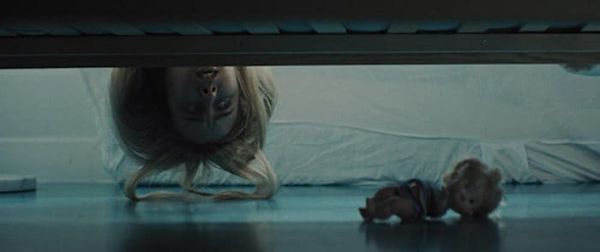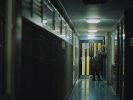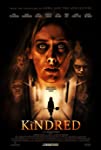Eye For Film >> Movies >> The Kindred (2021) Film Review
The Kindred
Reviewed by: Jennie Kermode

Suddenly having to take on the responsibility of parenthood is never not a shock. Overnight, one's life changes completely. How much more overwhelming it must be, though, when one had just been beginning to adjust to the idea of it only to miss the latter part of the pregnancy completely. Helen (April Pearson) is comatose when her little girl is born. She had just been to visit her father when she was hit by a car; and now, on waking up, she also has to deal with the news that he has killed himself.
At least she has Greg (Blake Harrison), who has looked after their daughter and do what he can to support her too, throughout. He has had to cut back on work to do so, however, which led to them losing their home and moving back into her father’s flat, which is an understandably distressing place for her to be. In order to manage their financial situation he really has to take on more work once she’s strong enough to walk again – which leaves her trying to look after a baby she feels no connection to (and who would clearly prefer to be with daddy) for hours and. in due course, days, all by herself. It’s no surprise that her mental health begins to break down. Perhaps that’s why she starts to see ghostly children in the flat – or perhaps something else is going on.

This sounds like a lot, but there’s very little extraneous material in this tightly plotted film, which screened at Frightfest 2021. From the start, Helen is haunted by that last conversation with her father, which she can’t consciously remember but whose emotional impact lingers. As she chats to neighbours and begins to investigate the weird things she’s experiencing, she begins to entertain dark suspicions about him – and about the disappearances of several children during her own childhood. The more that she grows in her conviction that he did something terrible, the more she becomes fearful that she may inherit some similar compulsion.
There’s a religious background to all this and if you share it then you’re likely to be more profoundly affected by the film. Helen’s father was part of a small, insular religious group, and moving from that background into secular society has left her without an obvious moral anchor. She finds some support from a friend of her father’s (played by James Cosmo) who tries to provide reassurance without obliging her to return to the faith, but with post partum depression (and perhaps even post partum psychosis) also a factor here, she struggles to believe in herself.
This psychological drama, which Pearson handles with impressive assurance, is the strongest part of the film. It also makes it a tough watch, especially in the latter stages, which recall something of the bleakness of director Jamie Patterson’s recent Justine. As in that film, he makes good use of the built environment, in this case the brutal concrete structures of Sixties council-built flats which make Helen’s world all the more claustrophobic, denying her any visual source of relief. It’s a landscape which immediately recalls television dramas of a certain type, and Patterson’s directorial style enhances this impression, which makes the film feel grounded in the real world even as it embraces supernatural plot elements. The mystery here is strong to begin with but loses ground as the story develops. The final twist is obvious and unnecessary, but the film continues to work at a thematic level and Pearson remains convincing. Although it’s not ultimately as strong as it should be, there’s a lot to recommend this.
Reviewed on: 27 Aug 2021
















